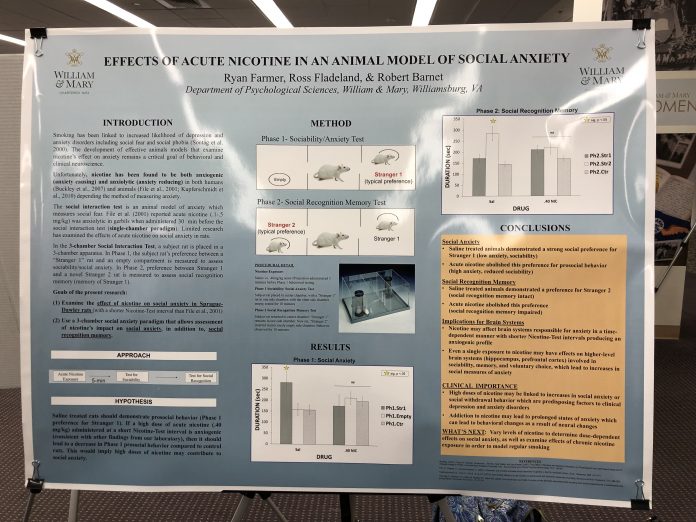Friday, Oct. 25, students and faculty at the College of William and Mary gathered in Earl Gregg Swem Library for the annual Fall Undergraduate Research Symposium.
During the event, undergraduates involved in or conducting their own research at the College presented their findings to members of the College’s community. Student presentations encompassed research conducted in a variety of interdisciplinary fields, including mathematics, science, arts and history.
Among the research projects presented at the symposium was a psychology study titled “Effects of Acute Nicotine in an Animal Model of Social Anxiety,” conducted by Ryan Farmer ’21, Ross Fladeland ’20 and associate professor of psychology Robert Barnet.
In humans, smoking has been associated with increased likelihood of anxiety disorders, but in both humans and animals, it has been established that nicotine is both anxiety causing and anxiety reducing. Therefore, the goals of the research were to investigate the effects of nicotine on the social anxiety of rats, specifically the Sprague Dawley breed, and to assess nicotine’s overall effects on social anxiety and social recognition memory.
“Specifically, we are kind of curious to see how nicotine affected anxiety pathways with regards to voluntary choice through sociability,” Fladeland said.
“Specifically, we are kind of curious to see how nicotine affected anxiety pathways with regards to voluntary choice through sociability,” Fladeland said. “So how rats would interact with other rats, and then also through their social recognition memory, which basically examines how rats interact with other rats previously given the fact that they already met another way.”
The research was conducted in two phases, one involving a sociability/anxiety test and the other involving a social recognition memory test.
In the first phase, the subject rat was placed in a center chamber, with another rat on one side and an empty chamber on the other side. The subject rat’s preference assessed its social anxiety. In the second phase, the subject rat returned to a chamber, but one side chamber contained the previous rat from the previous phase and the other side chamber contained a new, unfamiliar rat, assessing social recognition memory.
“The saline rats, which we used as our control, spent significantly more time with the stranger rat, which is what we expected to see because rats exhibit prosocial behavior when they’re not stressed,” Farmer said. “The rats we injected with 0.40 mg/kg of nicotine, which is a very high dose, got rid of that sociability effect which could imply that the high dose of nicotine was leading to social anxiety.”
The research’s conclusions established that the rats treated with nicotine exhibited high anxiety, reduced sociability and impaired social recognition memory, implying that nicotine may be connected to increases in social anxiety or social withdrawal behavior.
“Currently today, there has kind of been an upswing on the amount of nicotine being consumed in the United States, and the common argument that people say is if it’s not cigarettes, it’s not going to be bad for me because nicotine isn’t bad for you,” Fladeland said. “Our research, although it’s not pointed to always give us results, it is examining what just nicotine can do and I think from this we’re learning all kinds of things that can be applied.”
Another project at the symposium with approaches more grounded in the humanities was “Contours of Constitution: Geography, Interests, and the Early Political Institutions of Vermont and New Hampshire,” which was conducted by Antonia Coyote Farrell ’21.
“I researched the differences in the political characteristics between Vermont and New Hampshire,” Farrell said.
“I researched the differences in the political characteristics between Vermont and New Hampshire,” Farrell said. “I grew up in Vermont, and the politics are very town based and very collective — it’s all about provision of public goods. In New Hampshire, there’s very strong libertarian streak, which is just about the opposite of Vermont, and so my research question was how do we get to that point?”
Farrell conducted her project at home in Vermont, working out of Dartmouth College’s library system, delving into histories of towns and states, examining old state records and other artifacts in order to determine the economies of the towns and evaluating the geographical dispersion of early towns.
“My conclusion was essentially that the geography and attributes of Vermont and New Hampshire, meaning whether they have pine trees or maple trees, how many rivers they have, influence the constitutions, and it led to a system in Vermont where politics were very localized, and in New Hampshire where there was a very strong libertarian streak because there was a lot of discontent in politics,” Farrell said.
Regardless of the topic or subject, some undergraduates at the event expressed genuine interest in their research and that research experiences have been integral parts of their college life in addition to being intellectually stimulating ones.
“I think undergraduate research is really important because you can sit in a lecture hall and learn things all day long, but at the end of the day, research has to move forward and research only moves forward by people doing it,” Farmer said. “If you can get in a lab not only are you helping to advance what we know as a society, you’re also learning how to do research, how to answer questions, which is a skill for everyday life.”

